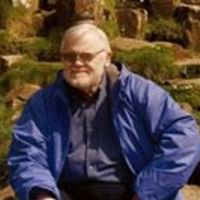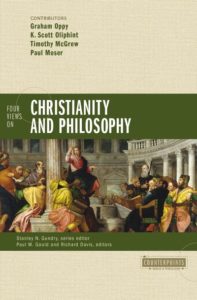
Members of the Evangelical Philosophical Society mourn the loss of friend, colleague, and teacher, Keith E. Yandell (b. 1938), who passed away on April 28th.
Since the 1960s, Keith’s dozens of articles and books have addressed multiple areas of philosophy, including issues in philosophy of religion, metaphysics, epistemology, philosophical anthropology, and Christian engagement with religious diversity and eastern religions. According to an announcement of his passing made by the Society of Christian Philosophers, Keith’s wife, Sharon, said that Keith “enjoyed most of all teaching and mentoring the many students he had in a 45 year career at UW-Madison and as an affiliate professor for several years at Trinity Evangelical Divinity School.” Additional remembrances are posted at Keith’s Facebook page. See also reflections from Thomas McCall and Harold Netland.
Within Philosophia Christi, the peer-reviewed journal of the Evangelical Philosophical Society, Keith’s papers were published on issues of metaphysics and philosophical theology, an appraisal of Plantinga’s religious epistemology, Hasker’s “emergent dualism,” an assessment of new interpretations of Kant’s philosophy of religion, and critiques of pluralist accounts of religions and religious diversity.
For example, in 1999, and in the inaugural issue of Philosophia Christi, Keith wrote on “Ontological Arguments, Metaphysical Identity, and the Trinity.” In this article, Keith seeks “to explore some accounts of the necessary and sufficient conditions of metaphysical identity” and their implications for “Anselmian and non-Anselmian views of the Christianity trinity” in order to argue that “if one is a Christian trinitarian theist, then – given certain plausible claims – one should reject the view that God has logically necessary existence” (83). His paper, as in much of his work, toggled between issues of metaphysics and philosophy of religion.
In 2000 (vol. 2, no. 2), Keith participated in a book symposium on William Hasker’s The Emergent Self, which also included contributions from Nancey Murphy, Stewart Goetz, and a reply from Hasker. Keith’s article – “Mind-Fields and the Siren Song of Reason” – attends to “powers attributed to matter by emergent dualism amount to this: when suitably configured, it generates a field of consciousness that is able to function teleologically and to exercise libertarian free will, and the field of consciousness in turn modifies and directs the functioning of the physical brain.” The article goes on to illuminate the ‘pretty severe tension’ “between the apparently mechanistic character of the physical basis of mind and the irreducibly teleological nature of the mind itself,” such that “the siren song of Cartesian dualism once again echoes in our ears” (183).
In the following year (vol. 3, no. 2), Philosophia Christi featured a book symposium on Alvin Plantinga’s Warranted Christian Belief, which included a paper from Keith – “Is Contemporary Naturalism Self-Referentially Irrational?” and also contributions from Douglas Geivett and Greg Jesson, Richard Fumerton, Paul Moser, and a reply from Plantinga. Keith’s paper offers a multi-point reflection on Plantinga’s argument, leaving the reader to ponder ‘how bad’ is the contemporary naturalist’s argument if Plantinga’s argument is correct?; it “depends not only on [Plantinga’s argument] being valid and having true premises, but on what exactly it does to a view to show that it supports the conclusions that one cannot rationally accept it.” Keith wonders, “Is this like a car having a little scratch on its fender, or like the motor’s parts having been fused by heat?” (356).
In 2007, Keith’s paper, “Who is the True Kant?,” was part of a book symposium on Kant and the New Philosophy of Religion (vol. 9, no. 1); the symposium was guest edited by Chris Firestone and with additional contributions from John Hare, Stephen Palmquist, Nathan Jacobs, Firestone and Jacobs, and Christophe Chalamet. Keith’s article renders a more cautious, as opposed to an optimistic view of the ‘new wave’ interpretations of Kant. “I take Kant, among other strengths, to be incapable of making uninteresting mistakes, which – if you think about it – is a very high compliment” (81).
Keith returned to issues of metaphysics and philosophical theology in a 2009 article (vol. 11, no. 2) co-authored with Thomas McCall, titled, “On Trinitarian Subordinationism.” In that paper, McCall and Yandell analyze “the claim that the Son is necessarily subordinate to the Father” in order to argue “that there are no good reasons to hold such a view but that there are strong reasons to reject it” since such arguments “often rest upon fundamental misunderstandings of the theological issues at stake, their arguments from Scripture bring important—but flawed—metaphysical assumptions into the exegesis of biblical texts, and their own proposal is either hopelessly mired in contradiction or entails the direct denial of the full divinity of the Son” (339).
Additionally, in that same 2009 issue of the journal, Keith contributed to a symposium guest edited by Chad Meister and that focused on philosophical and theological issues of “Religious Diversity,” which also included papers from Paul Moser and Paul Knitter. Keith’s paper – “Religious Pluralism: Reductionist, Exclusivist, and Intolerant?” – addresses the idea that religions differ in significant ways and also critiqued the idea that “Religious Pluralism is often taken to define the only unbiased, rational, and acceptable approach to the diversity of religions.” Keith goes on to say that “the Pluralist route is anything but unbiased or rational” and that rather than “being the only acceptable approach, it should be flatly rejected” (275).
Finally, in 2011 (vol. 13, no. 2), Yandell contributed to one more Philosophia Christi symposium, and this time centered on “God and Abstract Objects,” guest edited by Paul Gould, with additional contributions from Richard Davis and William Lane Craig. Keith’s article – “God and Propositions” – focuses the discussion this way: “Arguments that necessary existence is a perfection, and God has all perfections, assume that Necessitarian Theism is true, and hence consistent. Thus they do not provide reason to believe that Necessitarian Theism is true. Nonnecessitarian (‘plain’) theism is on a philosophical par with Necessitarian Theism and can accommodate abstract objects all the while avoiding theological and philosophical refutation” (275).
The above is but a microcosm of Keith Yandell’s faithful work. Keith’s mind, wit, prose, and rigor will surely be missed. Important areas of philosophy – e.g., issues in philosophy of religion – are better because of his leadership.
Learn more about Philosophia Christi, or subscribe today for as low as $25/yr (EPS membership includes a print subscription to the journal).






